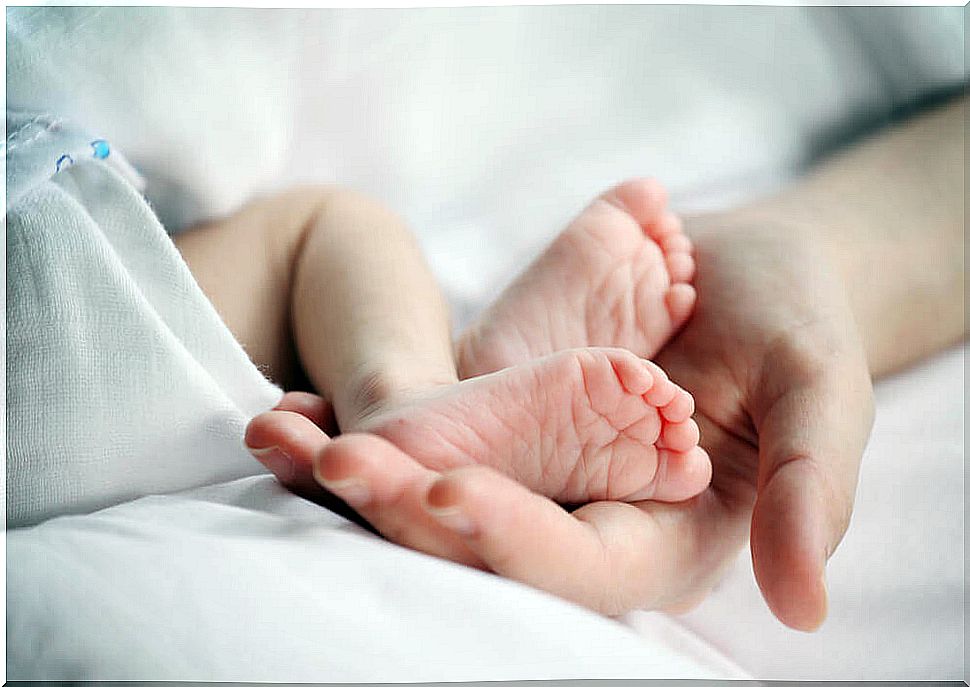Afraid Of Fetal Death? How To Proceed

Fetal death is one of the worst things a person can experience. Are you afraid of fetal death? We explain all about it in this article, and give you the knowledge you need.
You love your baby as soon as it starts growing in the womb. It’s not something you can do for. Your love will be there from the start and grow stronger and stronger during pregnancy.
Fetal death is so incredibly difficult because nothing in the world can replace the baby who died, no matter how many children you later have.
Afraid of fetal death? Two types of fetal death you need to know about
1. Stillbirth. When baby is born without life
Sometimes baby is formed inside the mother but cannot reach maturity and is born without life. Even though they never saw the world outside, they were still loved by their parents. And they will be remembered forever by their loved ones.
The baby did not get to know the world, and did not feel their mother’s hugs. But they filled their mothers with love that they will carry in their hearts throughout their lives. A stillborn baby is never forgotten, and is just as loved as if it had lived.

It is a sad memory in the mother’s heart. You have imagined what it will be like to be a parent to the child. Watch it be born, grow up and become its own person. The death of a baby robs you of that experience.
Even though you never got to know your baby, you had clear ideas about its life. You had hopes and dreams for what it would achieve, who it would become.
That is why it can also be so difficult to move on after fetal death. Your baby is dead along with all the aspirations you had for it.
The wounds never completely heal. And that’s okay. But we promise you that the pain will become more bearable with time. Allow yourself to grieve. There is no “deadline” – give yourself as much time as you need.
2. Spontaneous abortion
A miscarriage can be just as painful as stillbirth. Even if it is early in the pregnancy, you already have a very special bond with your baby.
You have set out to protect your little fetus, and already have hopes and dreams for it. You already imagine what it will be like to get to know the little new human being. It is therefore perfectly normal to be completely crushed and in deep grief if this happens to you.
How to move on after fetal death
It is incredibly difficult to move on after fetal death. The grief can feel so all-encompassing and heavy that sometimes you do not feel like living on at all. That you just want to close your eyes and hide under the duvet so the world disappears.
It is natural to be afraid of fetal death, and it is natural to grieve when it happens. As a society, we do not hold grief very well. It may feel like you need to get over it as soon as possible. But it is important you give yourself time and space as much as you need.

Fetal death is a taboo and it can be hard to talk about. If you have a good friend who would like to listen, then it can be incredibly soothing. Many also feel a strong urge to be close to their baby, for example by visiting the grave.
You should read: Pregnancy after the age of 35
Can fetal death be prevented?
It is normal to be afraid of fetal death. Especially if you have already experienced it once before. A new pregnancy can bring anxiety, questions and worries with it.
Questions like: Will it happen again? Is my body ready to bring a baby into the world? Am I ready to be a mother again? When will the risk of miscarriage decrease? After losing so much, it can be hard to try again.
There is the greatest risk of miscarriage before the twelfth week. Many spirits are therefore relieved when they reach the twelfth week. But for many, they are still afraid of fetal death until the baby is born.
Therefore, problems arise in pregnancy
If you are afraid of fetal death, then you probably want to do everything you can to avoid it. But unfortunately, it is not possible to control everything that happens during pregnancy. Here are some things that can go wrong:
The fetus
- Congenital anomaly or fatal genetics
- Chronic or acute infection
- Growth inhibition
The placenta
- Knotted umbilical cord
- Abrupt placenta (detachment)
- Severe aging of the placenta
- Premature membrane rupture
The mother
- Prolonged pregnancy of more than 42 weeks
- Chronic diseases of the mother
- Preeclampsia and eclampsia
- Infections during pregnancy
All of these factors are kept in mind by your doctor when you go for a checkup. They can usually catch problems early in the process and treat them before it becomes serious.
You will be interested in reading: 10 signs that you have hypothyroidism
It is difficult for the people around you to understand the loss of a mother, and therefore many do not talk about it either. We hope this article has helped break the taboo so we can talk openly about the terrible topic.

Some mothers have an easy and uncomplicated journey, while others are challenged beyond the usual. Unfortunately, it happens that fetuses die before they get a chance to live.
Reflection
If you ask your mother how many children she has and she says two, then you know why. Maybe she only has one living child. But her dead baby will also always be her child.









